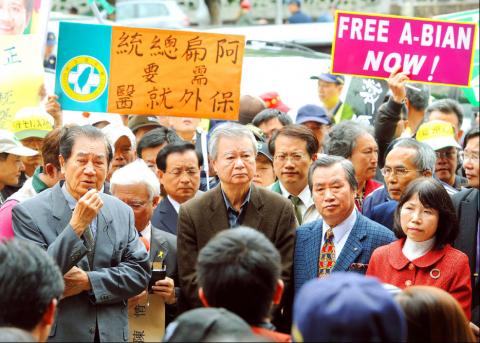Democratic Progressive Party (DPP) lawmakers yesterday called for a release for medical treatment or a prison transfer for former president Chen Shui-bian (陳水扁), who has been suffering health problems during his incarceration.
Chen, who is serving a 17-and-a-half-year sentence for corruption, was granted a seven-day release from Taipei Prison between March 6 and Tuesday last week for a medical checkup. He was found to be suffering from acute coronary syndrome and underwent a cardiac catheterization.
The Ministry of Justice should grant Chen a release for medical treatment on the grounds of human rights and humanitarianism, or arrange for Chen’s transfer to the Taichung Prison, which has a medical facility, DPP lawmakers said at a press conference.

Photo: Fang Pin-chao, Taipei Times
After the press conference, dozens of DPP and Taiwan Solidarity Union lawmakers, as well as about 200 supporters, including representatives from various civic groups, visited the ministry and submitted a letter of appeal to Deputy Minister of Justice Chen Shou-huang (陳守煌) to request a release and transfer.
The former president meets all three requirements for a transfer of prisons, as his spouse is handicapped, his mother is more than 65 years old and he has been released for medical treatment in the past three months, DPP Legislator Yu Mei-nu (尤美女) said.
The lawmakers then returned to the legislature and went to work, with 20 DPP legislators proposing an amendment to the Statute Governing Preferential Treatment to Retired Presidents and Vice Presidents (卸任總統副總統禮遇條例) to preserve preferential medical treatment for former presidents and vice presidents who are imprisoned.
The DPP and civic groups also raised the matter of Chen receiving amnesty, which would have to be granted by President Ma Ying-jeou (馬英九).
DPP Legislator Gao Jyh-peng (高志鵬) cited the cases of many former foreign heads of state, including former US president Richard Nixon, former French president Jacques Chirac and former South Korean presidents Chun Doo-hwan and Roh Tae-woo, who were all involved in scandals, but were granted amnesty by their governments and never served jail terms.
Even the Burmese junta placed Aung Sang Suu Kyi under house arrest rather than send her to prison, Gao said, adding that the Taiwanese government treated its former president worse than Myanmar did its dissidents.
“Premier Chen, do you think former president Chen should be granted an amnesty?” Gao asked Premier Sean Chen (陳冲), who responded that amnesty, according to the Constitution, is a presidential power and that he could not answer the question.
Gao, who was not satisfied with the answer, spent more than 10 minutes repeating the same question, with the premier replying in the same fashion each time.
The premier said he understood that Gao was raising the question on behalf of many supporters of the former president and he pledged to report the amnesty request to Ma.

SECURITY: As China is ‘reshaping’ Hong Kong’s population, Taiwan must raise the eligibility threshold for applications from Hong Kongers, Chiu Chui-cheng said When Hong Kong and Macau citizens apply for residency in Taiwan, it would be under a new category that includes a “national security observation period,” Mainland Affairs Council (MAC) Minister Chiu Chui-cheng (邱垂正) said yesterday. President William Lai (賴清德) on March 13 announced 17 strategies to counter China’s aggression toward Taiwan, including incorporating national security considerations into the review process for residency applications from Hong Kong and Macau citizens. The situation in Hong Kong is constantly changing, Chiu said to media yesterday on the sidelines of the Taipei Technology Run hosted by the Taipei Neihu Technology Park Development Association. With

A US Marine Corps regiment equipped with Naval Strike Missiles (NSM) is set to participate in the upcoming Balikatan 25 exercise in the Luzon Strait, marking the system’s first-ever deployment in the Philippines. US and Philippine officials have separately confirmed that the Navy Marine Expeditionary Ship Interdiction System (NMESIS) — the mobile launch platform for the Naval Strike Missile — would take part in the joint exercise. The missiles are being deployed to “a strategic first island chain chokepoint” in the waters between Taiwan proper and the Philippines, US-based Naval News reported. “The Luzon Strait and Bashi Channel represent a critical access

‘FORM OF PROTEST’: The German Institute Taipei said it was ‘shocked’ to see Nazi symbolism used in connection with political aims as it condemned the incident Sung Chien-liang (宋建樑), who led efforts to recall Democratic Progressive Party (DPP) Legislator Lee Kun-cheng (李坤城), was released on bail of NT$80,000 yesterday amid an outcry over a Nazi armband he wore to questioning the night before. Sung arrived at the New Taipei City District Prosecutors’ Office for questioning in a recall petition forgery case on Tuesday night wearing a red armband bearing a swastika, carrying a copy of Adolf Hitler’s Mein Kampf and giving a Nazi salute. Sung left the building at 1:15am without the armband and apparently covering the book with a coat. This is a serious international scandal and Chinese

COUNTERINTELLIGENCE TRAINING: The ministry said 87.5 percent of the apprehended Chinese agents were reported by service members they tried to lure into becoming spies Taiwanese organized crime, illegal money lenders, temples and civic groups are complicit in Beijing’s infiltration of the armed forces, the Ministry of National Defense (MND) said in a report yesterday. Retired service members who had been turned to Beijing’s cause mainly relied on those channels to infiltrate the Taiwanese military, according to the report to be submitted to lawmakers ahead of tomorrow’s hearing on Chinese espionage in the military. Chinese intelligence typically used blackmail, Internet-based communications, bribery or debts to loan sharks to leverage active service personnel to do its bidding, it said. China’s main goals are to collect intelligence, and develop a